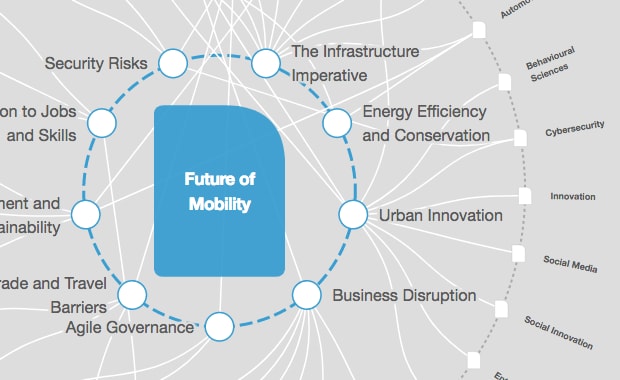This new Hyperloop pod could get you from L.A. to San Francisco in 30 minutes

Hyperloop Transportation Technologies, or HTT, is one of several companies seeking to build the world's first hyperloop. Image: REUTERS/Robert Galbraith (UNITED STATES - Tags: ENVIRONMENT TRAVEL CITYSCAPE) - GM1EACD0L9901

Explore and monitor how Mobility is affecting economies, industries and global issues

Get involved with our crowdsourced digital platform to deliver impact at scale
Stay up to date:
Mobility
Hyperloop Transportation Technologies, one of several companies racing to build the world's first hyperloop, unveiled a prototype of a full-scale passenger capsule recently in Spain.
Dubbed the Quintero One, the sleek passenger pod measures 105 feet long, weighs about five tons and is capable of carrying between 28 and 40 people at a time. It's been described as an airplane without wings, an apt description considering the pods would levitate above a magnetic track in a tube that's virtually free of friction, a technique called electromagnetic propulsion. This would allow each pod to travel at speeds exceeding 700 mph, fast enough to travel the 380 miles from San Francisco to Los Angeles in about 30 minutes.
HTT CEO Dirk Ahlborn hopes to have a full-scale hyperloop running in a few years.
"In three years, you and me, we can take a hyperloop," he told CNBC, adding that widespread implementation of hyperloop systems could occur within five to 10 years. "It's definitely much sooner than anybody would expect," Ahlborn said.
Based in California, HTT has said it wants to be the first company to build a hyperloop in the U.S. In February, the company published a video teasing the possibility of building a hyperloop that would connect Cleveland to Chicago, though Ohio officials said they'll need to complete a months-long feasibility test before HTT could potentially pursue the plans.
HTT plans to test Quintero One at a track in Toulouse, France. The company has already signed agreements with China, Ukraine and the United Arab Emirates to build full-scale hyperloops in the coming years.
In addition to HTT, two other companies are vying to build the first full-scale hyperloop in the U.S.: Richard Branson's Virgin Hyperloop One, which he hopes to have ready within three years; and Elon Musk's Boring Company, which recently began building a prototype of a tunnel system that could someday connect residential garages to a hyperloop.
Don't miss any update on this topic
Create a free account and access your personalized content collection with our latest publications and analyses.
License and Republishing
World Economic Forum articles may be republished in accordance with the Creative Commons Attribution-NonCommercial-NoDerivatives 4.0 International Public License, and in accordance with our Terms of Use.
The views expressed in this article are those of the author alone and not the World Economic Forum.
The Agenda Weekly
A weekly update of the most important issues driving the global agenda
You can unsubscribe at any time using the link in our emails. For more details, review our privacy policy.


